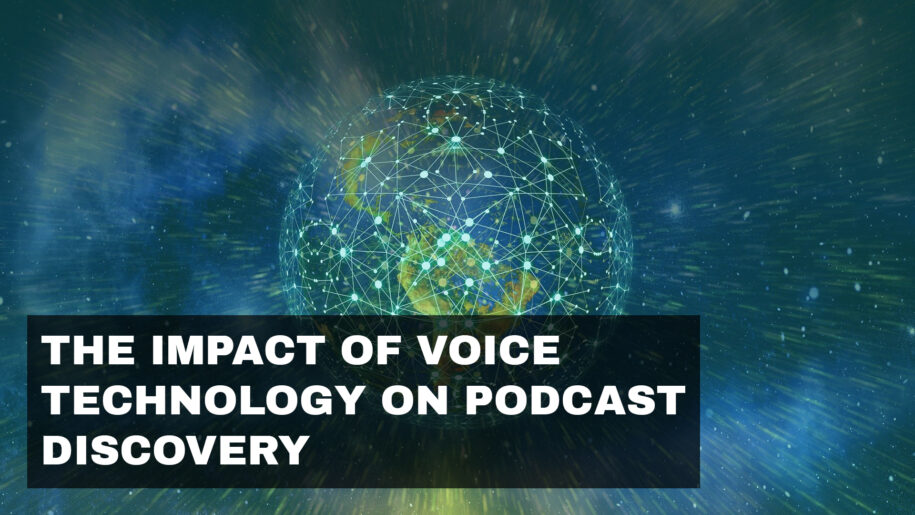Voice technology is revolutionizing the way we interact with digital content, and podcasting is no exception. As voice-activated devices like smart speakers and voice assistants become more prevalent, they are significantly influencing how listeners discover and consume podcasts. In this blog post, we’ll explore the impact of voice technology on podcast discovery and how podcasters can leverage this trend to reach a wider audience.
1. The Rise of Voice-Activated Devices
The popularity of voice-activated devices such as Amazon Alexa, Google Assistant, and Apple’s Siri is on the rise. These devices offer users a hands-free, convenient way to access information, entertainment, and services, including podcasts.
Example: “Smart speakers are becoming a common household item, with millions of units sold each year, providing an easy way for users to discover and listen to podcasts.”
2. Simplifying Podcast Discovery
Voice technology simplifies the process of discovering new podcasts. Users can simply ask their voice-activated device to find and play podcasts based on specific topics, genres, or even specific shows, making the discovery process more intuitive and user-friendly.
Example: “A listener can say, ‘Alexa, play a podcast about digital marketing,’ and immediately be connected to relevant content without having to search manually.”
3. Enhancing User Engagement
Voice technology enhances user engagement by providing a seamless and interactive experience. Listeners can control playback, skip episodes, and request specific podcast recommendations using voice commands, creating a more personalized listening experience.
Example: “Commands like ‘Hey Google, skip to the next episode’ or ‘Siri, recommend a popular podcast’ make it easier for listeners to engage with content hands-free.”
4. Voice Search Optimization (VSO)
Just as search engine optimization (SEO) is crucial for web content, voice search optimization (VSO) is becoming essential for podcasts. Optimizing your podcast for voice search involves using natural language, long-tail keywords, and concise descriptions that align with how people speak and search using voice technology.
Example: “Incorporate natural language phrases and questions into your podcast titles and descriptions, such as ‘What are the best tips for beginner gardeners?'”
5. Leveraging Voice Assistants for Marketing
Podcasters can leverage voice assistants for marketing by ensuring their podcasts are available on platforms compatible with these devices. Promoting voice search-friendly content and encouraging listeners to use voice commands to find your podcast can boost visibility.
Example: “Promote phrases like ‘Ask Alexa to play [Your Podcast Name]’ in your marketing materials to guide listeners on how to find your podcast using voice technology.”
6. Improving Accessibility
Voice technology improves accessibility for listeners who may have visual impairments or prefer hands-free interaction. By making podcasts easily discoverable through voice commands, you can reach a broader and more diverse audience.
Example: “Voice-activated devices allow users with visual impairments to easily access and enjoy podcasts without needing to navigate a screen.”
7. Future Trends in Voice Technology and Podcasting
As voice technology continues to evolve, new trends are emerging that will further impact podcast discovery. These include advancements in artificial intelligence, personalized content recommendations, and deeper integration with other smart devices and services.
Example: “AI-driven voice assistants will increasingly provide personalized podcast recommendations based on listening habits, making it easier for users to discover new content tailored to their interests.”
Voice technology is transforming the landscape of podcast discovery, offering podcasters new opportunities to reach and engage with their audience. By understanding the impact of voice-activated devices and optimizing for voice search, podcasters can enhance their visibility and accessibility. As this technology continues to evolve, staying ahead of trends and leveraging voice technology effectively will be key to success in the ever-growing podcasting industry.
Additional Tips
- Ensure Compatibility: Make sure your podcast is available on all major platforms that support voice-activated devices.
- Update Metadata: Regularly update your podcast’s metadata to include natural language keywords and phrases.
- Engage with Listeners: Encourage your audience to use voice commands to discover and share your podcast.
By embracing these strategies, you can harness the power of voice technology to boost your podcast’s discovery and expand your listener base.


